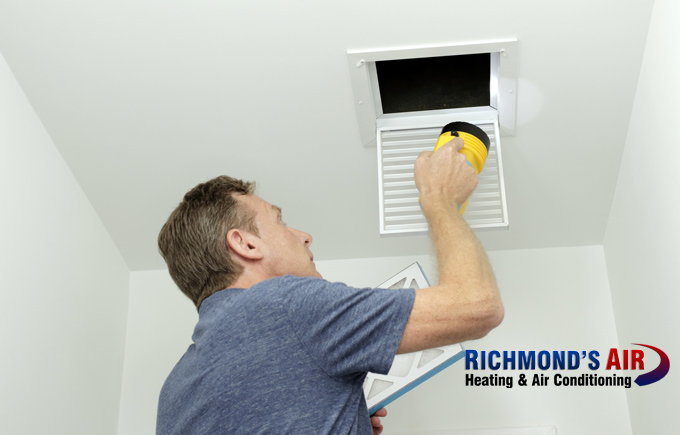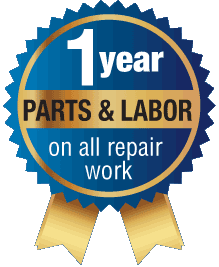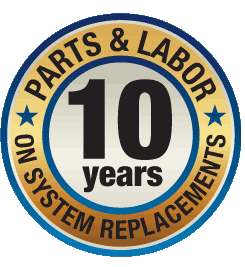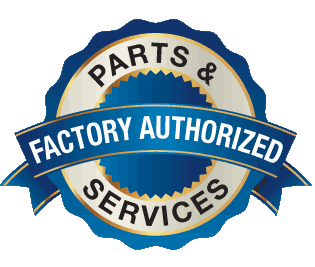Updated: November 26, 2024

We’re all looking for ways to keep ourselves and our families healthy by protecting against COVID-19. With so many of us stuck at home, whether it’s due to a stay at home order from your local government or a self-imposed quarantine, the indoor air quality of our homes has never been more important!
Common indoor air pollutants
The U.S. Environmental Protection Agency has found that the air inside of your home can be as much as 2 to 5 times more polluted than the air we breathe outside. Indoor air pollutants can include:
- Bacteria
- Dander
- Dirt
- Dust
- Mold
- Pollen
- Viruses
Any one of these microscopic biological contaminants can wreak havoc on the young, the elderly and those who are immunocompromised. These findings were true before we had a global pandemic to worry about.
6 tips for healthier indoor air quality
Fortunately, there are some simple steps you can take to improve the air quality inside your home:
1. Consider a UV light
You can get a germicidal UV light installed in your HVAC system that, if properly installed, helps kill bacteria and mold in your home.
2. Have good airflow
Good air circulation will let stagnant air move out of your home. To achieve good air circulation, you can occasionally open your doors and windows to create a cross breeze. If this option isn’t possible due to allergies, you might want to invest in a ventilator system.
3. Install an air purification system
Air filtration systems use a series of filters to clean the air in your home. HEPA filters, for instance, are a highly effective type of fiber filter that essentially sanitizes the air. It’s important to determine which type of air filter is best for you and your family based on your individual needs.
4. Make sure your system is clean
Dirty filters are much less effective than clean filters. Additionally, running your HVAC system with a dirty filter can cause your system to work harder and reduce the lifespan of your unit.
5. Keep your home’s humidity low
A whole-home dehumidifier, installed by a professional technician, is the perfect way to reduce the humidity levels in your house. The EPA recommends you keep your indoor humidity to between 30-50 percent. Higher humidity levels tend to allow mold and bacteria to thrive, harming your home’s indoor air quality.
6. Clean and inspect ductwork
If you don’t periodically clean the accumulated dander, dirt and dust out of your home’s HVAC ductwork, it could allow bacteria, mold and viruses to hang around your system.
Can an air purification system really help?
Here in Houston, many people rely on a heating and cooling system that keeps their homes closed off from not just the cold and heat, but also the pollen in the spring and fall months. Having optimal air quality inside the home is vital for allergy sufferers.
In these instances, while your AC unit may be equipped to handle the larger and visible particles in our everyday air (like dust), they aren’t typically able to handle microscopic particles such as dander, pollen and germs.
This is where an air purification system can help.
To combat the things you can’t see (i.e. germs and pollen), air purification systems utilize multi-layered filters to trap these smaller particles and prevent them from recirculating back into your home. For protection against smaller airborne particles (bacteria), you’ll want to choose an air purification system that can handle HEPA filters. Viruses can be trickier since they are even smaller particles. But even virus particles can be filtered out when they’re in the form of a larger sneeze droplet.
Air purifiers are not curative
While your respiratory system acts much like an air purification system and can help reduce the quantity of pollutants you inhale, installing one in your home probably isn’t going to make your allergies or asthma go away completely — nor is it going to guarantee that you won’t catch a cold, the seasonal flu or any other virus.
What you can expect if you install an air purification system, however, is less irritation to your respiratory system and fewer allergic reactions—both of which can improve your quality of sleep, which will, in return, help your immune system work optimally.
So rather than preventing illness, the benefits of an air purification system are in helping improve your quality of life by helping you stay healthy.
Home air quality and COVID-19
While improving the quality of the air inside your home won’t necessarily keep you from catching COVID-19, it can help improve your overall health, which will make it more comfortable to live in your home if you’re under a stay at home order.
In order to help reduce your risk of contracting COVID-19, follow these 4 tips from the experts:
- Wash your hands frequently, with soap and warm water, for at least 20 seconds. Increase your washing frequency if you’ve been in public or you have coughed, blown your nose or sneezed. If access to soap and water are not possible, use hand sanitizer.
- Don’t touch your eyes, mouth or nose.
- Practice social distancing. Avoid gathering in public places and close contact. If you’re feeling ill, stay at home.
- Keep your personal space clean. If you’re an essential worker, keep your office/workspace clean and frequently disinfect. Focus especially on frequently touched objects like phones, doorknobs, toilets, light switches and electronics (phones, mice, keyboards, etc.).
Here at Richmond’s Air, we are trying to do our part to help stop the spread of COVID-19. While we’re not currently scheduling routine maintenance appointments, we are still available for emergency unit repair and installations for those of you in the greater Houston, TX area.
Stay healthy, and we look forward to helping you with your HVAC needs!
 Read reviews
Read reviews








